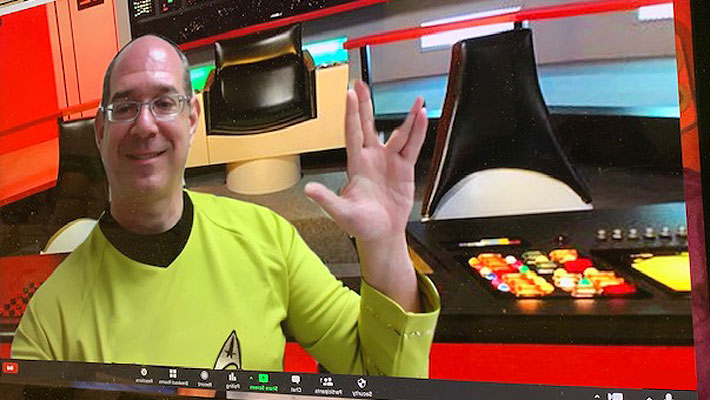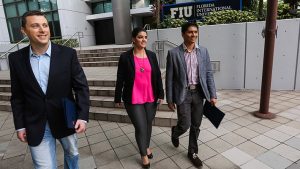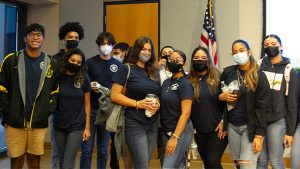The COVID-19 pandemic drove millions from the schools and workplaces they shared into a fully-remote working and learning environment in the space of a week. And while the mid-March move itself was a global shockwave, by late February, leadership at the FIU College of Business saw signs that a fully remote environment was a distinct possibility.

“We operate with an entrepreneurial mindset, and a culture that puts students first,” said Joanne Li, dean of the College of Business. Marshalling her leadership team into intensive planning before the official go-ahead, Li encouraged her team to reimagine how business education could be delivered remotely, not only in classes, but in the myriad services that support the student journey to personal and professional success.
It became a mindset that set the tone for challenges that have spanned months, sparking the creation of new ways of delivering education and support services during an unprecedented era. For example, on March 16, the day that FIU transitioned its operation remotely, FIU Business launched a CRM system to manage all incoming inquiries and set up protocols to address any concerns from students, parents, and outside stakeholders.
“Our entrepreneurial mindset demands that we think ahead and anticipate the needs of our community, especially in times of crisis,” Li said. “We must never be afraid to try new strategies. When we succeed, we open new doors of possibility for those we serve–most importantly, our students. If we fail, we fail quickly, and learn from our mistakes.”
Rethinking operations, from advising to career placement.
The adjustment process started with the student’s first touch point, the Office of Academic Advising. Almost two weeks prior to university course instruction switching to remote on March 11, the advising office planned and executed a seamless transition from in-person to a completely phone-and-Zoom environment. This gave advisors, the opportunity to work collaboratively on best practices for counseling students remotely.
As they juggled their own home challenges, going remote gave advisors the ability to stagger schedules.
“I made it clear we must be agile and flexible in our thinking. No longer can we cling to the traditional 8 to 4:30, as it’s going to be too difficult with children tugging at your sleeve,” said Kelly Ferguson, director of academic advising. “It’s been working better for both the advisors and students.” Availability of advisors on evenings, weekends, and even Memorial Day has enabled us to accommodate students more readily.”
Employing the use of intervention strategies to ensure students remain on track to graduate, the team monitored those close to graduation, reaching out with financial assistance to help them remain in school. For the spring term, 43 students were awarded over $76,000 through the in Dean’s Destination Scholarship, with 15 able to graduate because of the funding and 23 kept on track for summer.
For the summer, over $54,000 was awarded to 37 students, all on track to graduate. And as a side benefit of their new approaches to advising, Ferguson noted, advisors are starting the fall semester “with a renewed purpose, more committed than ever to student success.”
With the double-whammy of FIU employees working remotely and the economic uncertainty of the pandemic, the college’s robust in-person corporate recruiting program was put on hold. The pandemic led many employers to cancel highly anticipated internships for many FIU Business students, as others continued on remote.
John Nykolaiszyn, director of career services, searched for opportunity amidst the crisis. He knew the college’s corporate partners did not want to lose access to the relationships with talented students they had cultivated at the college. He also knew that students with an eye on making professional connections would welcome the opportunity to continue to build their skills and contacts while they worked at home.
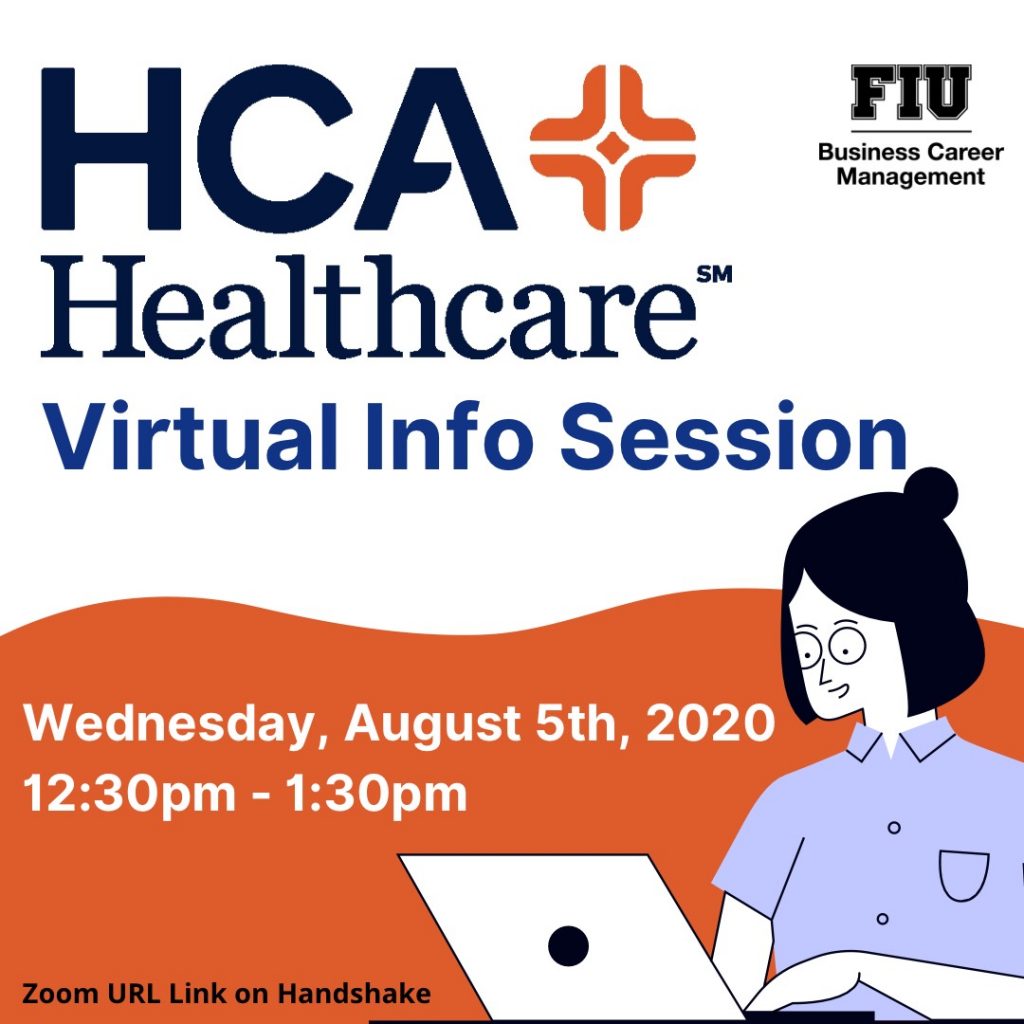
“We made a conscious decision to allow our employer partners to do certain workshops and programs that our team would normally do,” Nykolaiszyn said. “It builds their brands and keeps them engaged.”
Remote workshops cover the fine points of resume building, engaging on LinkedIn and virtual interviewing. Many are customized for and sponsored by partners including WalMart, Stanley Black & Decker and Enterprise Holdings. Ongoing projects include online AI-driven interview platforms to give students access to interview practice and critique – and in some cases, provide employers with a platform to meet and get to know potential interns and employees. Also in the works: a virtual career fair for this fall.

Building resources for students new and returning.
Prior to the pandemic, FIU Business had already offered online, interactive video open houses and webinars to promote graduate programs to prospective students, a practice that expanded with the pandemic. William Hardin, associate dean of the Chapman graduate school, noted that response to graduate programs has been strong, with early indications of an increase in enrollment across nearly all programs for the fall in spite of the challenge of the pandemic.
Working with both FIU and FIU Business technology services, Chapman financial aid staff set up a university-licensed CISCO software system that routed calls made to FIU Business phone numbers directly to the computers of staff members working from home. This allowed for a seamless transition and ongoing information flow. Staff members immersed themselves in learning about resources offered the CARES Act, becoming liaisons for FIU Business students seeking aid from the university.
“We wanted to step up whenever a student had an issue,” said Fabiola Ortega, manager of financial aid at Chapman. Staff members also found additional university grants of $1,000 each for many graduate students, expanding the number of those who received aid.
“In these times,” Ortega said, “every dollar helps.”
Faculty fuels the growth of a new learning environment.
On March 12, one day after the State University System of Florida Board of Governors directed all universities within the system to move to remote learning, FIU Business successfully transitioned 447 sections of face-to-face and hybrid classes to remote learning.
With over two decades of experience in online learning, FIU Business established itself as an early leader in effective teaching in a distanced environment. As a result, most FIU Business students were already familiar with taking classes fully online or had experienced remote learning in one of a growing number of hybrid classes.
But students were not the only ones to need help adjusting to the remote environment, said Richard Klein, associate dean for the Landon Undergraduate School. Faculty stepped up to mentor each other and share resources.
Arijit Sengupta, associate dean for accreditation and technology systems, created a series of short videos on the essentials of using each of four key technologies. He led the college’s technology team in making sure all faculty members had the supplies and equipment they needed to successfully teach remotely. He led workshops on how to use technology for remote and HyFlex teaching, and other tricks that made classroom learning more engaging.
The move to remote learning meant that students who once had access to sophisticated systems in finance and computer labs were cut off from their tools. The Department of Information Systems and Business Analytics made an application server, originally intended to host and develop innovative solutions such as blockchain and AI, available for students. This helped students who didn’t have an adequately powerful computer gain access to a system that could host applications they needed to complete assignments or take exams remotely. It also put the computational power of Bloomberg terminals and other financial and data analysis software only available in computer labs into the palm of students’ hands.
Faculty learn, and teach one another.
Gladys Simpson, an information systems and business analytics instructor, used her FIU Google account to route her office number to her cell phone during office hours so students could reach her seamlessly. When students started falling behind, she texted them.
“In most cases, that personal contact has been enough to get them back on track,” she said. She and many other faculty members and students found Honorlock, the system for taking remote exams, a big plus, and combined that with a Zoom session held during exam times. While most did not use it, “Students really like the fact that they can jump on the session if they need it,” she said.

Senior Instructor David Barman, who teaches business law in the School of Accounting, has turned his class opening into an ongoing montage of travel scenarios with matching backgrounds and costumes, from Hawaii 5-0 to Star Trek. Others have made less dramatic but eye-catching use of background tools and graphics. Raymond Rody, a visiting marketing instructor, built a video studio in his home, complete with special lighting and green screens.
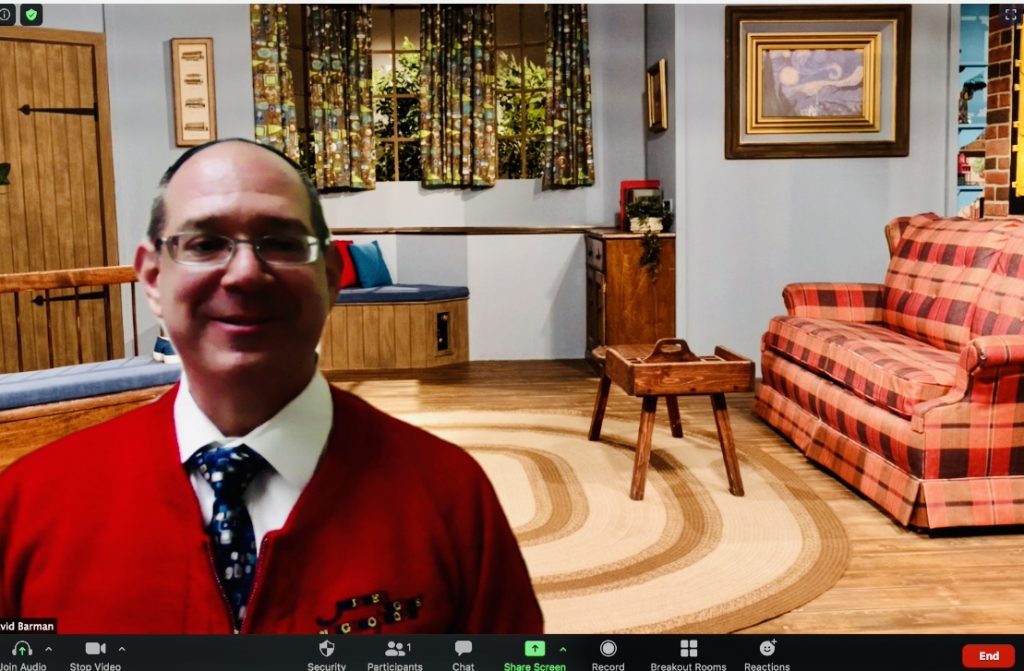
Moving toward the “return to normal.”
In planning courses for the fall, the FIU Business team has sought to give students the choice of in-person, remote and online learning to the greatest degree possible, introducing the new HyFlex model. Li recognizes that each student faces a different set of personal and academic challenges, and worked to establish learning modes that would meet all modalities.
“In the end,” Li said, “we are first and foremost about serving our students. This is our guiding principle, and this is how we will be judged.”


